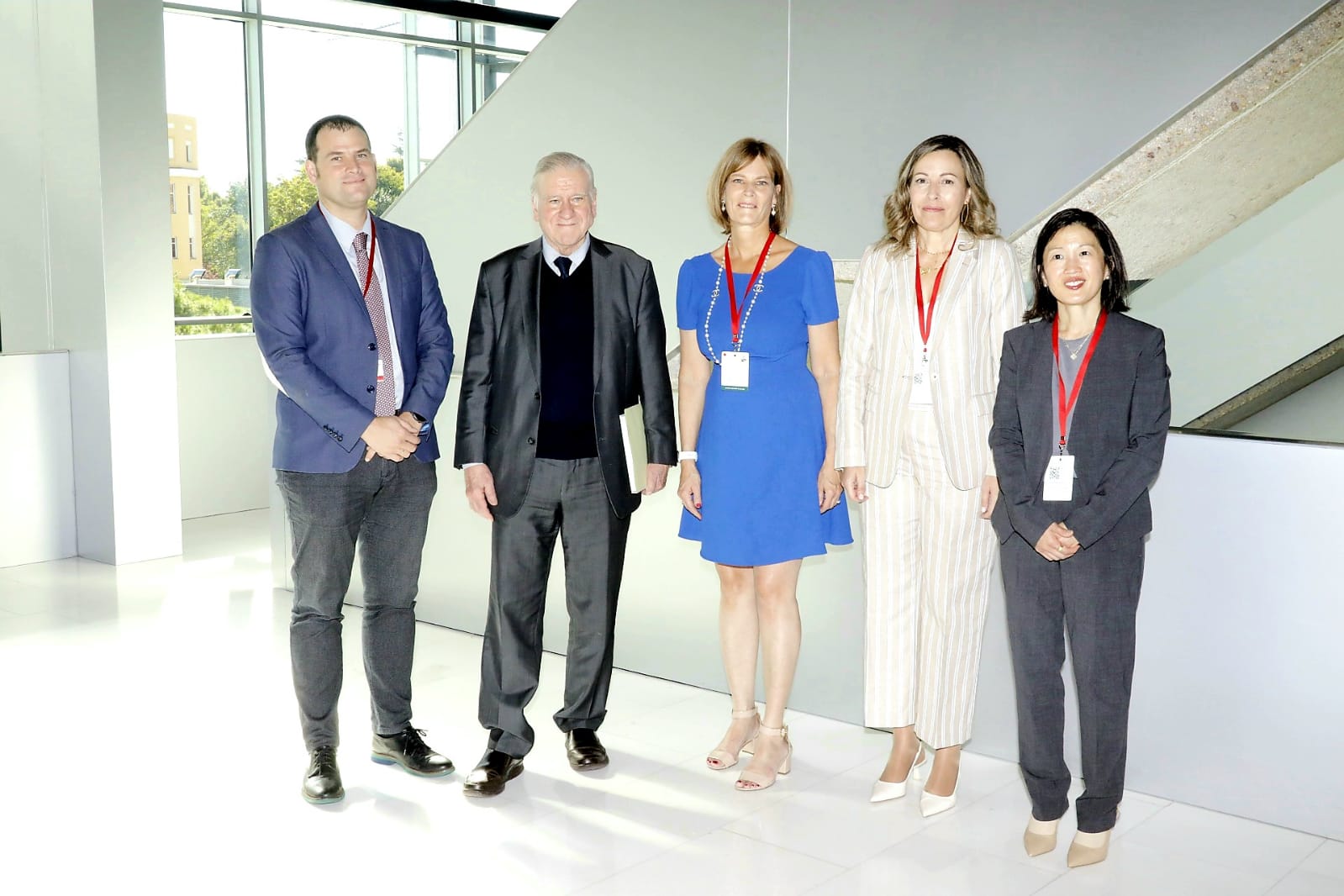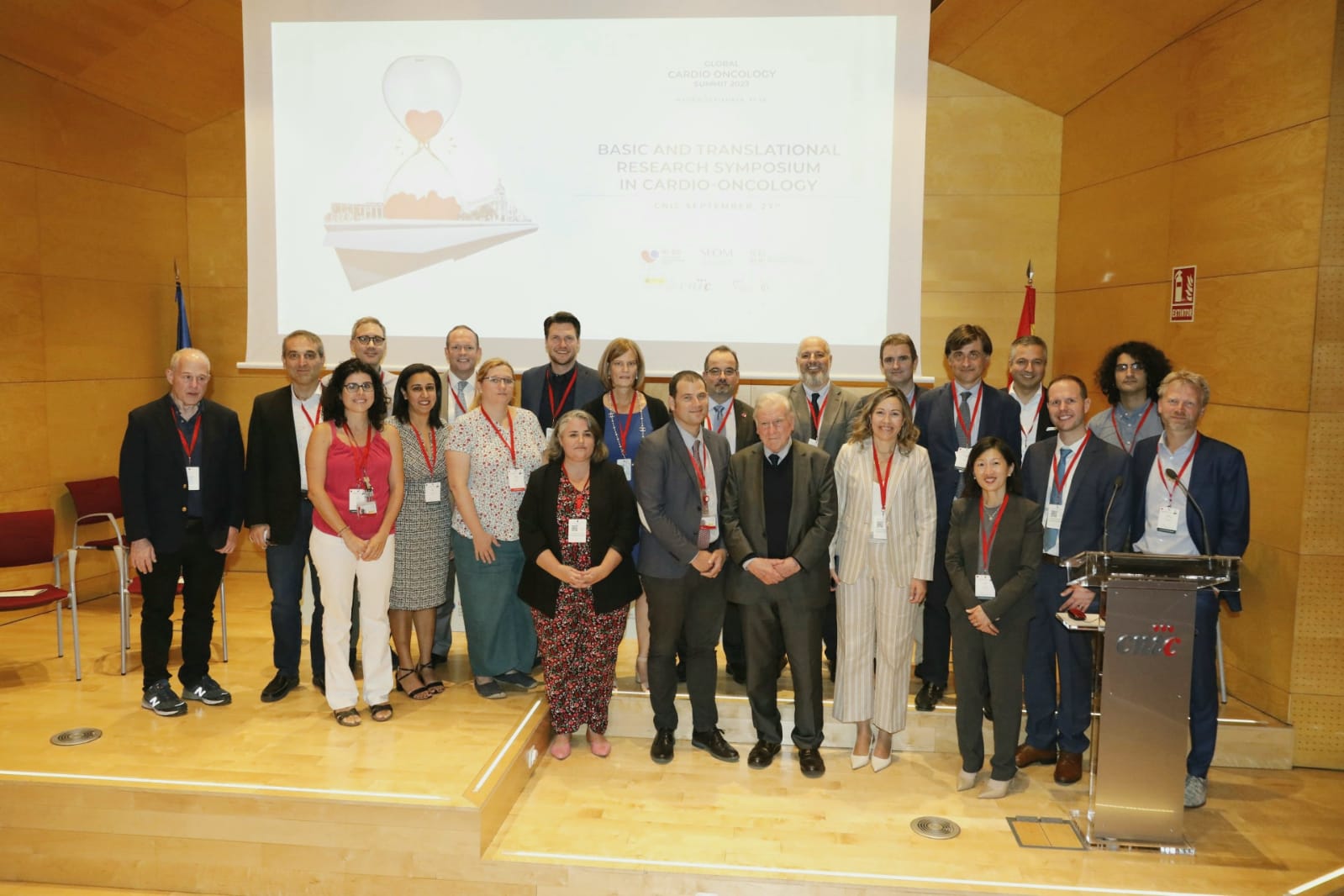CNIC hosts symposium of the world’s major cardio-oncology summit
The International Cardio-Oncology Society (ICOS), the Spanish Society of Cardiology (SEC), the Spanish Society of Medical Oncology (SEOM) and the Spanish Society of Haematology and Hemotherapy (SEHH) organised the Global Cardio Oncology Summit 2023 between 27-30 September in Madrid.
The Spanish National Centre for Cardiovascular Research (CNIC) hosted the first symposium of the Global Cardio Oncology Summit 2023 organised by the International Cardio-Oncology Society (ICOS), the Spanish Society of Cardiology (SEC) through its Cardio-Oncology Working Group, the Spanish Society of Medical Oncology (SEOM) and the Spanish Society of Haematology and Hemotherapy(SEHH).
It is known that at least one in every three patients with cancer develop cardiovascular toxicity. This has given rise to a new discipline, cardio-oncology, which deals with the cardiovascular needs of cancer patients and optimises their care through a multidisciplinary approach. “This is a sub-speciality of medicine centred on providing comprehensive cardiovascular care to patients with cancer from diagnosis to post-treatment survival”, clarifies Dr Teresa López, Coordinator of SEC’s Cardio-Oncology Working Group.
The symposium held at CNIC focussed on translational and basic research. At the symposium, during a session organised by the JAAC with the participation of its editor, Dr Bonnie Ky, the General Director of CNIC, Dr Valentín Fuster, commented that “unfortunately, the toxicities associated with chemotherapy treatments in patients with cancer are frequent. We know that there are risk factors which affect both diseases, and that’s why we have to go one step further and be able to identify these patients during the initial phases of their diseases. The future of cardio-oncology, in my opinion, should be aimed at preventing the two diseases”.
The symposium on translational and basic research held at CNIC is the first of its kind to take place in Europe and has brought together researchers from different fields of specialization who care for cancer patients. The coordination of these professionals enables basic researchers to focus on subjects that are relevant to improving patient care, while clinicians gain access to this information and validate the results of basic research.
“In cardio-oncology we need greater depth of knowledge about the mechanisms of cardiovascular toxicity in antitumoral treatments so as to develop risk scores and personalised prevention strategies”, explains the Coordinator of SEC’s Cardio-Oncology Working Group.
To highlight the value of this symposium, Dr Valentín Fuster, General Director of CNIC and editor in chief of JAAC, and Bonnie Ky, editor of JACC Cardio-Oncology, joined by other speakers at the symposium, have written an article published in JACC Cardio-Oncology
Among other interesting topics dealt with during the research symposium and the rest of the conference was the session on immunotherapy connected with the SIR-CVT project, a registry started up by SEC, SEOM and CNIC, RESILIENCE, one of CNIC’s star projects, led by Dr Borja Ibáñez; and a talk on how anthracyclines accelerate cellular ageing and, therefore, produce heart failure.
As Dr Borja Ibáñez, coordinator of the RESILIENCE project and CNIC Scientific Director, explains, currently “there are two great unsolved clinical needs related to cardiotoxicity associated with the use of anthracycline: the lack of therapies that can prevent or cure the condition, and the absence of specific markers to identify the problem in its first stages”.

Moreover, cardio-oncology does not just focus on preventing toxicity. As seen in another of the most noteworthy sessions, there is a growing increase in the number of patients with cardiovascular diseases who develop cancer. This is why cardiologists must organise their screening strategies for cancer and collaborate with oncologists so that these high-risk patients can benefit from treatments for which they are generally not eligible because of their high risk. Another aspect covered was women with cancer and cardiovascular disease, and how to sustainably organise the monitoring of children and adults who survive cancer. “The longevity and quality of life of cancer survivors has drastically improved in recent years, thanks in great part to the development of new therapeutic options against cancer. Although the number of cancer survivors has increased, so has the incidence and prevalence of toxicity related with antitumoral treatments. This is so much so, that the cardiovascular toxicities related with antitumoral treatments have become a frequent challenge for both patients and doctors.” explains Dr Teresa López.
As representative of the SEHH, Dr Raúl Córdoba Mascuñano, member of its Board of Directors, highlights that “we need to adopt a truly multidisciplinary approach for all patients with cancer, above all for those who will be long-term survivors, who we need to provide with comprehensive healthcare before, during and after the end of treatment.”
Dr Javier de Castro, SEOM vice president and member of the Cardio-Oncology Working Group points out: “In its role as guarantor of comprehensive care for oncological patients, SEOM considers it important to preserve the cardiovascular health of cancer patients. To do so, multidisciplinary work alongside cardiologists and other specialists is a basic element, not only to prevent the cardiovascular side effects that oncology therapies can trigger, but also to foster quality of life beyond the oncological disease”.
For Javier de Castro, “holding the ICOS conference in Spain is a landmark that shows the scientific level achieved by Spanish cardio-oncology and the level of cooperation between the different professionals”.











